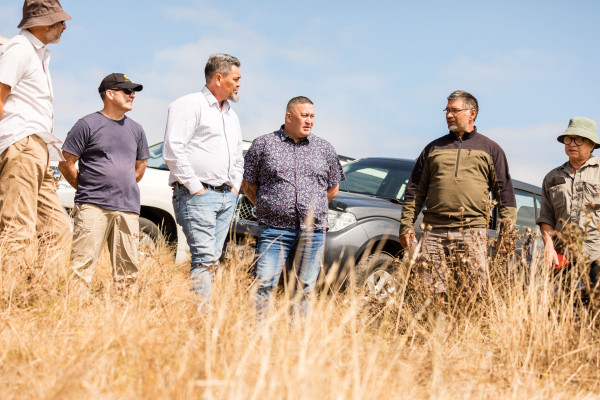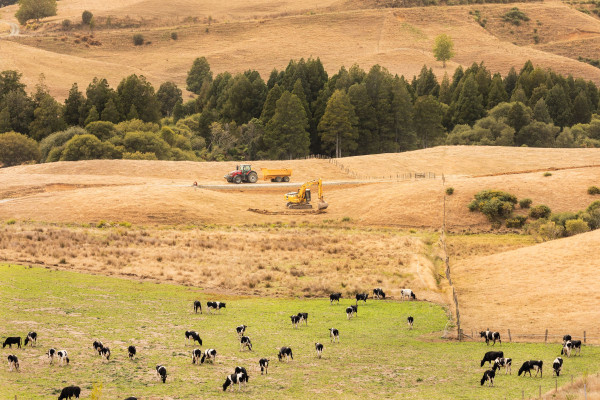Guided by kaupapa Māori and anchored by the values of kaitiakitanga, manaakitanga, whanaungatanga, and whakapono, the Trust has a bold mission: to build successful, sustainable Māori-owned businesses that create jobs, nurture leaders, care for the environment, and return real value to the people they serve.
Since 2019, AgResearch has been walking alongside Aramiro on that journey — not as a distant institution, but as a trusted partner, co-designing science-backed solutions to meet local goals.
Science that strengthens decisions
The partnership took off when Brett Te Whare, a respected figure in Māori farming, took up the role of farm manager. With his deep knowledge of both land and people, Brett helped connect the Trust with AgResearch’s Māori partnerships team. What followed was a relationship built not only on shared knowledge, but on shared trust.
The first challenge was environmental — and a vital one. The Trust wanted to protect their waterways while still maintaining a productive farming system. Using scientific modelling and mapping, AgResearch helped show how riparian planting could reduce sediment and faecal contamination without sacrificing farm performance. The numbers stacked up, the values aligned — and every stream on the farm’s pastureland was eventually fenced and planted. The result? Cleaner water, thriving biodiversity, and a practical example of kaitiakitanga in action.

Innovation in kai sovereignty
Next came a more radical idea: a mobile micro abattoir. The Trust saw an opportunity to bring meat processing closer to the farm — reducing cost, waste, and emissions while strengthening the local food system. AgResearch had already been exploring the concept with a range of partners, and a formal agreement was signed to investigate how it might work at Aramiro.
Over time, the vision evolved. Rather than a mobile unit, the focus shifted to a permanent micro abattoir and the challenge of building a farm system to supply it. AgResearch stepped in again — redesigning the forage plan, modelling beef finishing systems for year-round supply, and exploring how to use offal and byproducts to increase carcass value and lower costs for local whānau. This wasn’t just science — it was sovereignty, circularity, and sustainability rolled into one.
Although Cyclone Gabrielle and funding shifts paused the abattoir’s rollout at Aramiro, the project is now being picked up at a larger iwi level through Tainui Group Holdings — with Aramiro poised to be a key supplier. The work done has laid the foundation for a value chain that keeps the benefits of kai close to home, in every sense of the word.
Farming smarter, not harder
Science has also helped Aramiro unlock new productivity from the land, without adding cost or compromising values. A trial in deferred grazing — resting pasture during the spring flush to save feed for leaner months — proved successful enough to scale from five to 35 hectares.
AgResearch modelling suggests the approach could deliver over $21,000 in annual returns across the farm, while also making life easier for staff by reducing the need for supplementary feed and allowing smarter allocation of time. It’s a prime example of how even small shifts, backed by data, can have ripple effects across a whole system.
Biochar and beyond
Now, the partnership is breaking new ground again — quite literally — with the launch of Aotearoa’s first long-term field trial into biochar in pastoral systems. Biochar, a charcoal-like substance made from forest waste, has potential to improve soil quality, boost pasture growth, reduce greenhouse gas emissions and lock carbon into the soil.
With AgResearch and the New Zealand Agricultural Greenhouse Gas Research Centre, Aramiro is testing how different types of biochar from their own forests perform on their soils. It’s a decade-long exploration of how the whenua can heal and feed itself — and what that might mean not just for Aramiro, but for other farms in the region and country.
The true return on investment
For Aramiro, the science has delivered more than numbers. It has empowered decision-making. It has preserved and enhanced the land. It has created opportunities for innovation that are grounded in tikanga and tailored to the aspirations of the people.
For AgResearch, the return has been just as powerful: a deep, durable partnership; a living lab for sustainable systems; and insights that can shape the future of Māori agribusiness across Aotearoa. With Brett Te Whare now working with Tainui Group Holdings across more than 2,700 hectares, the relationship is set to grow even further.
This is what science looks like when it’s embedded, responsive, and values-led. Aramiro isn’t just farming differently — they’re showing the way forward for others who want to combine innovation with integrity, and profitability with purpose.

Key Numbers from the Aramiro Partnership
1,800 ha – Total land managed by Aramiro Whenua Trust
330 ha in pasture
560 ha in 1st-rotation pine forest (currently harvesting)
900 ha in native ngahere
100% of riparian zones on pastoral land fenced and planted, following modelling of water quality and profitability outcomes.
$21,700 – Estimated annual return from implementing deferred grazing on 35 ha, based on AgResearch modelling and pasture regrowth benefits.
35 ha (10% of pastoral area) – Now under deferred grazing, up from an initial 5 ha trial.